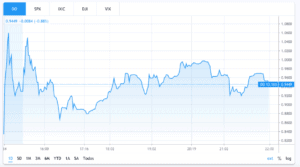Offshore oil drilling company Diamond Offshore (DO) has filed for bankruptcy with debts of $2.6bn as crashing oil prices begins to claim scalps in the industry
“After a careful and diligent review of our financial alternatives, the board of directors and management, along with our advisors, concluded that the best path forward for Diamond and its stakeholders is to seek chapter 11 protection,” said the chief executive of the Houston-based firm, Marc Edwards (pictured), in a statement on Monday.
Adding: “Through this process, we intend to restructure our balance sheet to achieve a more sustainable debt level to reposition the business for long-term success”.
Shares of Diamond Offshore (DO) had already collapsed ahead of the announcement, as investors probably anticipated the decision in light of the recent turmoil in the oil market. Diamond lost 36% of its value during the 12 days preceding the news and the stock has dropped 87% so far this year, closing yesterday’s session at $0.94, down $7.19 per share it registered in January 1.
Diamond sells contract drilling services through a fleet of 15 offshore rigs to major oil companies including BP, Occidental Petroleum (OPC), and Petróleo Brasileiro, all of which have been cutting their capital expenditures for 2020 as a result of the recent collapse in oil prices that sent oil futures onto negative territory only a few weeks ago.
Diamond Offshore lost $357m in 2019, and has run up around $2bn in long term debt along with roughly $150m in cash by the end of last year. It also drew $400m from a revolving credit facility recently to cope with the temporary crisis, yet it cited that “financial and operational conditions… have continued to deteriorate in the weeks following such responses”.
Analysts expect more failures across the industry, as low oil prices put weaker firms under pressure, especially those with large debts.
Brent crude, the international benchmark, at around $21 a barrel is at its lowest price in around two decades, while US standard, West Texas Intermediate, is at $14, but earlier this month had fallen below zero for the first time in history. Prices have been hit by the aftermath of a price war between Russia and Suadi Arabia, a lack of storage and a slump in demand caused by the slowdown in economic activity caused by the coronavirus pandemic.
Trusted & Regulated Stock & CFD Brokers
What we like
- 0% Fees on Stocks
- 5000+ Stocks, ETFs and other Markets
- Accepts Paypal Deposits
Min Deposit
$200
Charge per Trade
Zero Commission on real stocks
64 traders signed up today
Visit Now67% of retail investor accounts lose money when trading CFDs with this provider. You should consider whether you can afford to take the high risk of losing your money.
Available Assets
- Total Number of Stocks & Shares5000+
- US Stocks
- German Stocks
- UK Stocks
- European
- ETF Stocks
- IPO
- Funds
- Bonds
- Options
- Futures
- CFDs
- Crypto
Charge per Trade
- FTSE 100 Zero Commission
- NASDAQ Zero Commission
- DAX Zero Commission
- Facebook Zero Commission
- Alphabet Zero Commission
- Tesla Zero Commission
- Apple Zero Commission
- Microsoft Zero Commission
Deposit Method
- Wire Transfer
- Credit Cards
- Bank Account
- Paypall
- Skrill
- Neteller
What we like
- Sign up today and get $5 free
- Fractals Available
- Paypal Available
Min Deposit
$0
Charge per Trade
$1 to $9 PCM
Visit Now
Investing in financial markets carries risk, you have the potential to lose your total investment.
Available Assets
- Total Number of Shares999
- US Stocks
- German Stocks
- UK Stocks
- European Stocks
- EFTs
- IPOs
- Funds
- Bonds
- Options
- Futures
- CFDs
- Crypto
Charge per Trade
- FTSE 100 $1 - $9 per month
- NASDAQ $1 - $9 per month
- DAX $1 - $9 per month
- Facebook $1 - $9 per month
- Alphabet $1 - $9 per month
- Telsa $1 - $9 per month
- Apple $1 - $9 per month
- Microsoft $1 - $9 per month
Deposit Method
- Wire Transfer
- Credit Cards
- Bank Account





